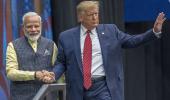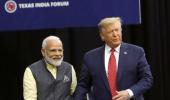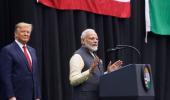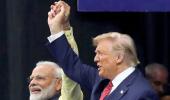'The biggest takeaway is that the US-India relationship, which has sputtered a bit in recent months, enjoyed a big boost.'
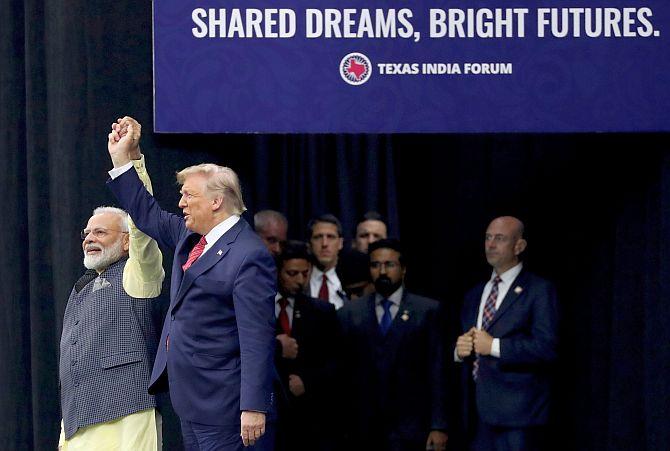
"The image of Trump and Modi walking around the stadium, hand in hand and beaming broadly, was one for the ages," Michael Kugelman, deputy director of the Asia programme and senior associate for South Asia at the Wilson Center, a leading Washington, DC think-tank, tells Archana Masih/Rediff.com.
How would you characterise the Modi-Trump encounter in Houston on Sunday morning?
I think it went about as well as the two men and their governments could have hoped for.
They shared the stage, lavished praise on each other, and even took a victory lap of sorts around the stadium, which offered some soaring optics and attested to the personal chemistry between the two leaders.
Also, the added bonus was that even with many unscripted moments, there were no awkward comments or gaffes from Trump.
And the biggest takeaway from all this is that the US-India relationship, which has sputtered a bit in recent months, enjoyed a big boost.
Were you satisfied or disappointed by what you heard or saw?
For me, as an analyst taking it all in, it's less about satisfaction or disappointment and more about what resonates the most. For me, it was the fact that each man appeared to elevate domestic politics to the forefront of the debate.
Both men, and especially Trump, sounded like they were making campaign speeches. This is wholly predictable for Trump, who saw the Howdy Modi event as a great political opportunity, but a bit surprising for Modi, who just recently won a second term.
In that regard, if there's something to be disappointed about, it's that there wasn't as much focus from Trump and Modi as one could have hoped for on the US-India relationship. But then again, at the end of the day, this was a political rally. So perhaps we shouldn't be surprised.
Did the optics -- an American president alongside an Indian prime minister just weeks after he declared he was willing to mediate in Kashmir and after India's action in Kashmir -- outweigh everything else?
The optics, at least for me, were a major component of this event.
The image of Trump and Modi walking around the stadium, hand in hand and beaming broadly, was one for the ages.
At that moment, the personal chemistry between these two men was on full display. All this said, by ratcheting up the optics, as the two men clearly wanted to do, they also incurred a risk.
They have given fodder to their many critics who will seize on these optics and argue that it's only natural that two men who harbour the same conservative and divisive and indeed dangerous politics would want to be joined at the hip.
But at the end of the day, Modi and Trump can shrug off such criticism. And given their strong bases of political support, they can afford to do so.
We expected a declaration of an India-US trade deal when President Trump spoke. Clearly, both sides, who were said to be working hard at achieving a deal before Houston, are further apart than what was surmised.
In your opinion, what are the thorny issues in achieving a trade deal and removing the irritants in the relationship?
I would have been surprised had there been a trade deal finalised in Houston. The objective now is to get one before the end of the UNGA meetings in New York, though that will be hard as well.
Trade has always been a particularly stubborn problem for US-India relations, because trade is a powerful political issue and each leader needs to be careful not to alienate key constituencies.
During the Trump era, the US side has been the main roadblock. Let's be very clear: For Trump, trade is a signature issue and a core pillar of his 'America First' and 'Make America Great Again' platforms, so he will not easily make compromises on trade -- and even when it comes to top partners like India.
Indeed, for all the focus on US trade spats with rivals like China, the Trump administration has also become embroiled in trade tensions with iron-clad partners like Japan. So it's no surprise that there would be these ongoing challenges on the trade side with India.
And with the US presidential election fast approaching, Trump's willingness to compromise will be especially limited.
The bottom line is that while there is a very real possibility of a trade deal between the US and India, anything to emerge will likely be quite watered down -- and a far cry from an FTA-type accord.
The only news from President Trump's speech was the announcement of the first tri-services military exercise -- Tiger Triumph. Don't you think that was pretty small pickings for an event billed as the first of its kind, where POTUS traveled all the way to Texas?
It seems like ever since the civil nuclear deal, there has been an expectation that any meeting involving an Indian prime minister and US president will bring some type of big-ticket agreement or other substantive outcome.
Most of the time, that's not the case. I don't think anything big, on a substantive level, was in the cards for Houston.
Trump made the trip to Houston because he saw something in it for him -- specifically, a big political opportunity. He saw an opportunity to connect with, and make an appeal to, a key voting demographic in the battleground state of Texas.
Indian Americans have tended to vote Democratic, but the Republican party has sought to change that with major outreach over the last few years.
Trump wanted to seize the moment and try to draw the support of a large number of Indian Americans. And what better way to do that than to appear at an event for an Indian prime minister adored by so many Indian Americans.
From a domestic political lens, attending the Howdy Modi event was a no-brainer for Trump.
Did you get the impression that both leaders were in campaign mode?
Modi in post-election triumphal mode; Trump working the desi crowd before 2020.
In that sense, the India-US relationship didn't gain much from the Howdy Modi event, did it?
Or did Trump's appearance alongside Modi restore the equilibrium in a relationship that had been on a downward spiral for the last year or so?
Yes, both leaders were certainly in campaign mode. And this is a bit more surprising for Modi, given that he only recently won a new term with a very large mandate.
He is at a point where he can afford to rest on his laurels. But clearly that wasn't in the cards for Modi. Still, even though Trump and Modi treated the event like a campaign stop more than as a venue for a foreign policy address, the US-India relationship clearly benefitted.
And that's because the event offered a high-profile platform for the two leaders to reaffirm their respect for each other.
One would not want to overstate the importance of personalities in international relations, but it is quite clear that two countries will always get along better if their leaders share respect and chemistry.
And that is clearly the case with Modi and Trump.
Another factor here is the Indian Diaspora itself. This is a community that has used its size and influence to help champion the US-India relationship over the last few decades, and with those Indian Americans at the Houston event clearly enamored with both Modi and Trump, there is reason to believe that the Diaspora will step up its efforts to promote the US-India partnership -- a particularly timely intervention as the relationship has sputtered a bit thanks to commercial tensions and an upsurge in cooperation between the US and India's rival Pakistan.
Do you believe the India-US relationship can only get better hereon? What do you expect will happen in the short-term? In the long-term?
On a broad level, the trend lines are quite positive. There are core, shared, interests such as combatting terrorism and pushing back against China that will remain entrenched.
Each side sees the other as a key partner in its respective foreign policy goals. The various tension points -- especially trade -- are very real, but shouldn't impact the fast-growing security partnership so long as those tension points don't spiral out of control.
And that is unlikely. There will probably be some type of modest trade deal to lower temperatures.
Also, India's S-400 deal with Russia is unlikely to cause major damage to US-India relations, given that New Delhi actually appears to be distancing itself a bit from Moscow even as it moves closer to Washington.
But while the short-term trajectory is quite strong, there are still some considerable long-term challenges to the US-India partnership. For me, the big one is a disconnect in expectations rooted in how each side envisions the strategic partnership.
For India, it's all about arms deals, intelligence sharing, and technology transfers. America values these dimensions, but it also wants more cooperation on operational levels.
To this point, New Delhi hasn't been willing to come though on that latter front. This is a disconnect that will have to be addressed at some point if the two sides truly want to take the relationship to a new level and move beyond the soaring rhetoric and aspirational talk.
Will growing defence trade ties underpin this relationship more than anything else?
Yes. Defence trade is a big priority for India and the US.
And with Trump, a transactional commander in chief to the core, occupying the White House, Washington will be happy to let arms sales set the tone on the defence partnership.
I think we can also expect there to be a focus on finalising the few remaining 'foundational' agreements that the US prefers to sign with its closest defence partners.
But, again, at some long-term point, perhaps in the post-Trump era, there will be a reckoning about US-India defence ties, with both sides needing to have a candid discussion about what strategic partnership should really mean -- and, if there are disagreements, whether the two sides can agree to meet halfway.
Will President Trump try to get Prime Ministers Modi and Khan talking soon? Or do you think Trump has no time left in this final quarter of his term in office for an India-Pakistan initiative especially when the Middle East is on the boil?
What then can we expect from America in the region in this final 14 months of Trump's first term?
As a matter of principle, Trump would be supportive of the idea of facilitating talks between Modi and Khan.
Trump views himself as a negotiator and peacemaker extraordinare, and he relishes opportunities to bring together the most bitter of rivals -- whether the US and North Korea, Iran, or the Taliban; or the likes of the Indians and Pakistanis or Israelis and Palestinians.
That said, I don't think anything is in the cards here. First, despite what Trump might say -- and with Trump meeting both Khan and Modi this week, he may well have India-Pakistan talks on his mind -- I just don't think this is a priority for his administration.
There are so many other things going on internationally, what with the situation in the Middle East in particular, and at home, especially with a new whistleblower case against Trump -- a major potential scandal even by the standards of the Trump era.
Second, even if Trump decided to make time and try to make something happen on the India-Pakistan dialogue front, I don't think he'd get much traction.
I just don't think that either side would be receptive to external prodding for talks right now. The tensions and the mistrust and the anger are just too acute.
Each side has dug in and refused to budge. And even someone like Trump, with his ability to transcend all this, won't easily be able to shift the calculus.
What do you think Modi and Trump each hoped to achieve from Houston? And in your opinion was that purpose served?
Each man had purely political goals, and they both achieved them.
For Modi, the idea was to solidify his support among Indian Americans and NRIs. And based on the results -- a large crowd that greeted and cheered Modi enthusiastically -- he got what he wanted.
For Trump, the goal was to capture the support of members of a key voting constituency that has long favoured Democrats but, thanks in great part to outreach from the Republican party, could change course a bit. Naturally there's no way of knowing whether those at the event will vote for Trump.
Still, he will be encouraged. He was a big hit, based on the type of enthusiastic response he got. Of course, what likely endeared Trump to the Indian-American audience the most was his agreeing to come to, speak at, and stay for the entirety of, an event for Prime Minister Modi who is wildly popular among much of the Indian-American Diaspora.
